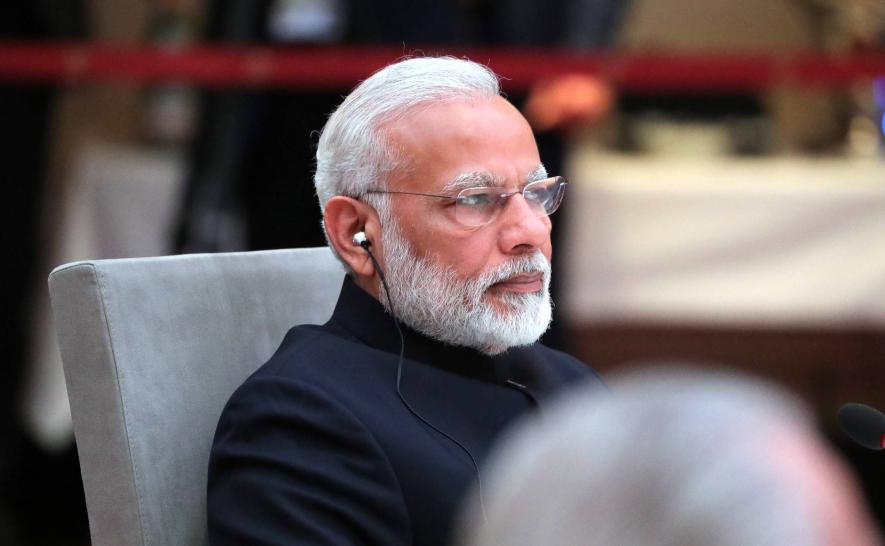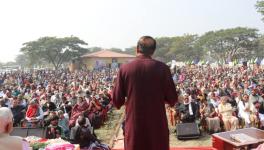Modi@8: BJP Talks of ‘Welfare’ and ‘Service’……

Prime Minister Narendra Modi completed eight years in office on 26 May 2022. In 2014, after the general election in which the then incumbent Congress-led alliance lost badly to the BJP led alliance, Narendra Modi had first taken up the prime minister's post. In 2019, he again led the alliance to victory in the general elections.
Since BJP is self-admittedly committed to winning every election, it is but natural that the party is already gearing up for the 2024 general elections. It also has some important State Assembly elections coming up in the coming months, including the Gujarat election later this year. So, it has turned the 8th-anniversary celebrations into prepping for the coming elections.
At a meeting of its top office-bearers held in Jaipur on 19-20 May, it not only praised PM Modi for leading the country in the past eight years but also chalked out some plans for going among the people to educate them on the empowering policies of the Modi government. All Union ministers were reportedly asked to visit different areas of the country and spend a night with a ‘beneficiary’ family, that is, a family which has benefitted from one of the government schemes launched by the central government. These schemes, many named after the ‘PM’ are propagated as ideas of Modi himself. In fact, a statement issued after the meeting praised Prime Minister as being ‘an epitome of kindness and compassion’ in the context of these schemes.
This office bearers meeting also announced that the 8th-anniversary celebrations would revolve around the slogan "Sewa, Sushasan, Garib Kalyan", which means – service, good governance, welfare of the poor. Then, on 26 May, a series of strategy meetings were reportedly held at the BJP headquarters in Delhi, in which the plan for the 8th anniversary was further fleshed out. The campaign would be carried out from 30 May till 15 June. Senior party leaders would be visiting Lok Sabha constituencies to spread the message and, presumably, start the ball rolling for the next election. The BJP, in its deliberations, has already identified 144 constituencies where it lost last time as the target for visits by senior leaders.
All this sounds impressive and par for the course as far as BJP is concerned. It is a dedicated election machine, and with enormous resources at its disposal, well placed to carry out long plans to win elections. However, can elections be won only on immaculate strategies alone?
SEWA-SUSHASAN-GARIB KALYAN
First, let us look at the triple slogan. Clearly, the BJP is trying to project itself as a party that has been working for the people’s upliftment. The lynchpin of this is the diverse schemes and programmes it has launched or (in many cases) repackaged. These include giving free gas connections (Ujjwala Yojana), opening Jandhan bank accounts, providing 5 kg free food grain during the pandemic years (PM Garib Kalyan Anna Yojana), and building houses for rural poor (PM Awas Yojana), etc.
It is true that some of these schemes have brought benefits to people, with the proviso that a substantial section of people are still left out. For instance, the popular PMGKAY scheme of free food grain started in May 2020 to ameliorate the pandemic, and the lockdown impact benefitted 80 crore people approximately, but since the numbers were based on the 2011 Census, it was estimated that about ten crore people were left out of the life-saving scheme. In addition, the scheme is now floundering, with wheat procurement down by about 50% this year. There are already signs that governments at the state level are casting around for ways to curtail the distribution, with calls for thorough vetting of ration cards going out (as in Uttar Pradesh). Similarly, the Ujjwala Yojana has suffered a steady decline because the subsidy on LPG was ended in 2018, and cylinder prices have increased by over Rs.400 in the last year, preventing almost all beneficiaries from taking refills.
But the more pertinent question is this: do all those who benefit from such schemes vote for the BJP? Even the BJP itself is unsure, as shown by the fact that it is chalking out a programme to educate people about these schemes. If everybody was benefitting, then what was the need for this ground-level approach? Or, if all beneficiaries were inclined to support the BJP, then why did it lose seats in many states?
Which brings us to yet another question: what is the effect of the ongoing economic crisis on voters’ inclinations?
ECONOMIC CRISIS ERODING BJP’S SUPPORT
Even those who, say, benefitted from one or more schemes would be affected by the devastating effects of the economic crisis, which is marked by raging unemployment, record inflation and stagnant or declining earnings. This crisis not only dents the BJP's electoral support but also blows the 'sushasan' (good governance) slogan out of the water.
As all the recent state Assembly elections have shown, jobs remain the biggest economic flashpoint. The unemployment rate has been hovering at 7-9% for the past nearly three years and shot up to an incredible 25% during the first lockdown in 2020. Nearly 10 lakh posts are lying vacant in the central government itself, and another 30 lakhs are vacant in state governments. Apart from rather reluctantly continuing the rural jobs guarantee scheme, the Modi government has done precious little to generate jobs, apart from launching schemes that have miserably failed. These include giving cheap loans to entrepreneurs (Mudra) or skill development programmes. These failures show the hollowness of the ‘good governance’ slogan.
The price rise has also devastated family budgets, with retail inflation at an eight-year high of 7.8% and wholesale inflation at a thirty-year high of 15%. Food prices have increased, even more, led by cooking oil and other essentials. Even wheat prices have spiked, while the good governance meant that PM Modi was encouraging wheat exports at the very time!
Earlier in the eight-year rule, the Modi government caused two spectacular shocks to the economy by demonetisation in 2016 and then rolling out of GST in 2017. Both turned the economy upside down, and both were supposedly examples of 'sushasan'!
The biggest policy failure – the inability to boost the economy and create jobs – has emanated directly from the flawed policy of thinking that the corporate sector should be given concessions so that it invests more and creates jobs. This has turned out to be a complete failure, inevitably. All the corporate tax cuts and imposition of Labour Codes to impose hire-and-fire regimes on workers have only led to super-profits for the corporate sector while people's living standards have plummeted.
INCREASING STRIFE AND DIVISION
The BJP is often portrayed rightly as a party committed to the use of religion to further its political interests. Since Modi 2.0 came into power in 2019, this RSS backed face of the BJP has emerged much more openly, as seen in the abrogation of Article 370, bringing in of discriminatory citizenship laws, fanning of communal division by various organisations affiliated to the larger Sangh Parivar, majoritarian propaganda and even conflict on issues like love-jihad, hijab, uniform civil code, etc. While it is true that this leads to mobilisation and consolidation of a section of the majority community voters, it is a double-edged weapon. It also causes large sections of people to start worrying about the disruption of normalcy due to communal conflict, the loss of earnings and the loss of life and property. The raking up of issues like the Gyanvapi Mosque in Varanasi or Krishna Janma Sthan-Shahi Idgah issue in Mathura, not to mention demands relating to the Taj Mahal, Qutub Minar and other historical monuments, is increasingly turning people, especially young people, away from such toxic politics.
Perhaps this is why the BJP is – for the present – concentrating on trying to revive its support by sending all its leaders to campaign about the welfare schemes to mark the 8th Anniversary. It is a measure impelled by hope and a dash of desperation – not the grand strategic stroke the mainstream media is making it out to be.
Get the latest reports & analysis with people's perspective on Protests, movements & deep analytical videos, discussions of the current affairs in your Telegram app. Subscribe to NewsClick's Telegram channel & get Real-Time updates on stories, as they get published on our website.
























